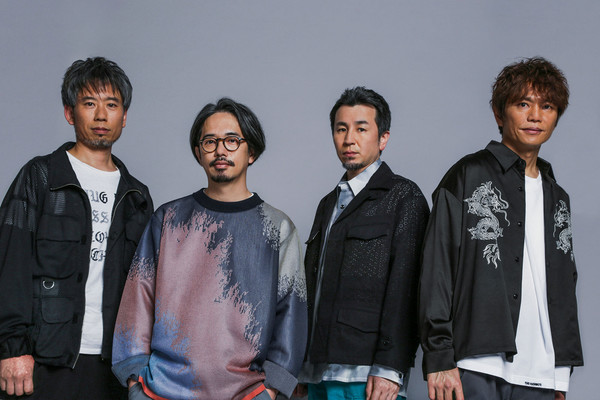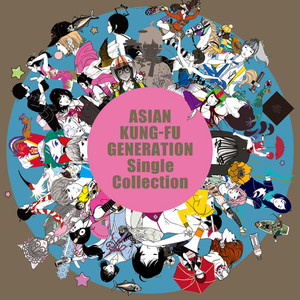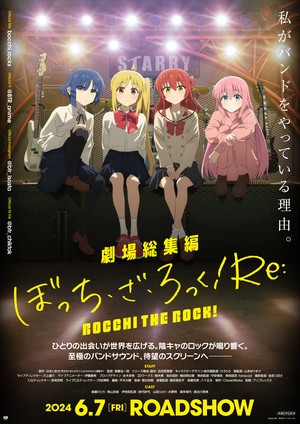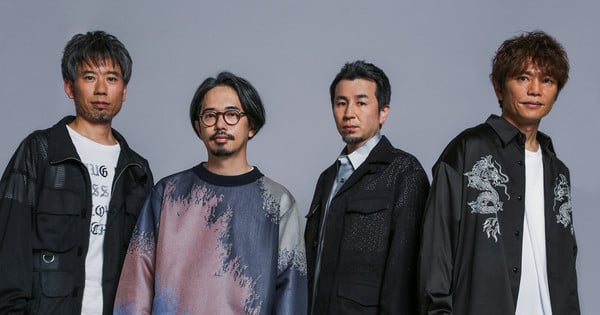Curated From www.animenewsnetwork.com Check Them Out For More Content.
In 2003, ASIAN KUNG-FU GENERATION exploded into the anime scene with “Haruka Kanata,” the second theme song for the popular Naruto anime. The crunchy guitar riffs and raw vocals brought an alt-rock sensibility rare for anime theme songs. The next year, fans of big action-driven shonen series would hear from them again as they provided Fullmetal Alchemist with the final theme song, “Rewrite“. Twenty years later, the band is celebrating the 20th anniversary of their major-label debut including a re-recording of “Haruka Kanata.”

© Ki/oon Music.
They’ve provided theme songs to a number of anime and film projects, including The Tatami Galaxy, Tekkon Kinkreet, and ERASED. While fans in the U.S. may know them best for their anime work, they’re far more than an anisong band, with ten albums and several EPs under their belt. The band first formed in 1996 between Masafumi Gotoh on vocals and rhythm guitar, Kensuke Kita on lead guitar, Takahiro Yamada on bass, and Kiyoshi Ichiji on drums. After several years playing at small clubs in Yokohama, they made their major label debut in 2002 with Hōkai Amplifier. Their album art was designed by illustrator Yūsuke Nakamura, who has continued to grace all their albums with his distinctive artwork.
With Hōkai Amplifier reaching number 35 on the Oricon charts, the band faced a meteoric rise in the summer of 2003, first headlining at the club Shelter in Shimokitazawa, then performing at the festivals Fuji Rock and Summer Sonic, and finally releasing their first major-label single, “Mirai no Kakera.” That fall, their first full-length studio album Kimi Tsunagi Five M reached an impressive number five on the Oricon charts. Since then, they’ve released several number-one hit singles, performed at the Budokan, gone on several world tours, and even played alongside Weezer, one of their biggest influences. The band is beloved for their indie garage rock sound, balancing strong bass lines, catchy guitar riffs, and powerful vocals that shift between melodic singing and raw screaming.
Most recently they’ve caught the attention of anime fans for being one of the major inspirations behind kessoku band, the main group in the music manga/anime Bocchi the Rock!. The members–Hitori Gotoh, Nijika Ichiji, Ryo Yamada, and Ikuyo Kita–are named after the members of ASIAN KUNG-FU GENERATION. Furthermore, the club they play at, Starry, is visibly based on Shelter, and their musical style has a similar alternative rock sound.

© Ki/oon Music.
What can fans expect from this collection?
Gotoh: Our band is approaching its 30th anniversary, and in Japan, our fans are changing from generation to generation. We have already released 10 albums, and I think it is a common concern for artists all over the world, that from which album to get new listeners to listen to our music. By collecting singles on a single collection album, we can follow the chronology of our activities, and people may be able to notice our interests in each period. We thought that the 20th anniversary would be a good time to review our activities and present our music to the new generation, so this is why we decided to release this single collection.
How would you like longtime fans and more recent fans to enjoy this?
Kita: Thinking of myself as a longtime fan, when I listened to the singles in the order of release, I made many discoveries.
This collection is ordered from the most recent songs to the oldest, and it was very fresh for me. It gave me various sonic discoveries and hints of what kind of songs would be good for ASIAN KUNG-FU GENERATION in the future.
This must be a meaningful piece for longtime fans.
For recent fans who may not know many of our songs yet, I hope they will listen to them and find their own favorites! ASIAN KUNG-FU GENERATION‘s singles are all very good!
How does it feel to be revisiting Haruka Kanata?
Yamada: The first thing you hear is the bass intro, and since you have heard the old version so many times, I wondered what I should do for the intro. I brought out some of the old instruments and equipment and recorded the sound with them because I thought that if I played it now, it would sound different from the old version, and some of the old goodness would come together. It’s pretty cool. I worked hard on the intro of course, but we all sounded great. I think we were able to record the new “Haruka Kanata” that the current ASIAN KUNG-FU GENERATION performs.
What has changed since you first recorded it? Were there any particular challenges?
Gotoh: After a long time has passed since the original recording, the way I sing has changed with age. How to bridge the gap between the roughness of my youth and my matured singing style, which I believe has grown with age, was one of the challenges I had to overcome. In the end, I expressed myself honestly using my body as it is now, but there was a lot of pressure because I was always imagining how the fans would listen and feel.
Last year, you celebrated the 20th anniversary of your major label debut. Do you feel anything different from the 10th anniversary?
Gotoh: I feel that the members are much more relaxed now, and we are able to proceed without detours when writing or recording a song.
As I’m sure you know, the characters from Bocchi the Rock! are named after the band members, and their musical style is inspired by yours. Are there any other parallels?
Gotoh: Rather than the characters tracing some style to us, I feel that this work represents very well the atmosphere of the local rock scene in Tokyo (Shimokitazawa) at that time. The music of the kessoku band is more influenced by our senpai bands, such as Number Girl, rather than ASIAN KUNG-FU GENERATION, I think.

©はまじあき/芳文社・アニプレックス
Do you feel any connection to Bocchi the Rock! or its fans?
Gotoh: I know that many people have encountered our music through anime, and I think we will feel that kind of connection from here on out. It would be great if more new audiences would come to our shows in the future.
I also heard that many anime fans from overseas are visiting the live house in Shimokitazawa (Tokyo), where we spent our youth. I think we have made some interesting connections with people from across the sea. I’m amazed at how influential the anime is.
You’ve been collaborating with Nakamura Yusuke since the beginning of your career. What drew you to his art? What is your relationship like?
Gotoh: When I saw his art, I thought it was very Japanese-like. I thought there must be an affinity with the band name that bears the words “ASIAN” and “KUNG-FU.”
For example, when I imagined people from overseas coming to Tower Records in Shibuya, which was probably the No. 1 store in the world at that time, to buy records and CDs, I thought that they would pick up our CDs with his artwork. His illustration looked like it would stand out among other cover art.
He is a very good friend of mine. He is also one of my sympathetic supporters, and when we talk about music, he often understands what I mean better than the band members.
He is an illustrator, but he has a great understanding of music. Maybe he has a high sense of empathy or some kind of ability like that. He is a very interesting man.
How does the process of writing a song for a show or movie differ from usual?
Gotoh: When we make a song for a show or a movie, we get some kind of requests, so we have to consider that. For example, requests come in for a fast-paced song or a song that fits the storyline of the show for the ending…so I think about that.
Most of the rest are the same, but in my case, if there is an original work, for example, a novel written before the movie is screened, I read the novel very carefully.
If there is a manga to be adapted into an anime, I read all of the comics that have been published at that time.
I am interested in what kind of feeling or will is driving the work as a whole, and I also adapt the lyrics of the songs accordingly.
Do you have any messages for your international fans, both those of us who have loved your music for decades and those who may be just discovering your?
All: We really felt people’s love and appreciation for our music when we played overseas. We truly feel your love, and we are very grateful for that. We will continue to make works with our sincerity, so please listen to our music again.
